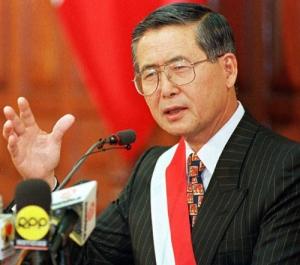 Hôm nay, 3/1/2010, Tòa án Tối cao của Peru đã giữ nguyên bản án 25 năm tù giam đối với cựu tổng thống gốc Nhật Alberto Fujimori.
Hôm nay, 3/1/2010, Tòa án Tối cao của Peru đã giữ nguyên bản án 25 năm tù giam đối với cựu tổng thống gốc Nhật Alberto Fujimori.
Nguyên thủ quốc gia Peru từ 1990 đến 2000, ông Fujimori bị truy tố và kết án 25 năm tù trong phiên xử kéo dài 16 tháng, kết thúc hồi tháng tư năm ngoái, với tội danh vi phạm nhân quyền.
Trường hợp cụ thể thứ nhất là tại Lima, năm 1991, một gia đình 15 người bị một toán võ trang bịt mặt hạ sát. Dường như toán sát thủ đánh lầm mục tiêu.
Trường hợp thứ hai là một nhóm 9 sinh viên và vị giáo sư thuộc cánh tả bị bắt cóc và hành hình năm 1992.
Các hành vi này xảy ra trong chiến dịch bài trừ lực lượng du kích cộng sản trong đó có phong trào nổi danh là « Con đường sáng ».
Chính phủ của tổng thống Fujimori đã sử dụng những phương pháp ngoài vòng pháp luật, như qua bàn tay của « Lữ đoàn tử thần ».
Nhiều thường dân đã chết oan trong chiến dịch này.
Năm nay 71 tuổi, bản án 25 năm tù xem như án tử hình đối với vị tổng thống gốc Nhật.
Một dân biểu cùng phe của ông cho rằng bản án này là một hình thức « thanh toán chính trị » vì « không có cơ sở kết án ». Và đảng của ông sẽ « trả hận » bằng chiến thắng trong cuộc bầu cử sắp tới.
Theo các kết quả thăm dò ý kiến, con gái của cựu tổng thống Peru, Keiko Fujimori, 34 tuổi, một dân biểu rất được lòng dân, có nhiều hy vọng về nhất nhì trong cuộc chạy đua giành ghế tổng thống năm 2011, với ứng cử viên Luis Castaneda, đô trưởng Lima.
BBC NEWS:
Fujimori gets lengthy jail term
Former Peruvian President Alberto Fujimori has been sentenced to 25 years in jail for ordering killings and kidnappings by security forces. At the end of a 15-month trial, judges found him guilty of two death-squad killings of 25 people during the conflict with guerrillas in the 1990s.
After being sentenced, Mr Fujimori said he would appeal against the verdict. Human rights group Amnesty International described the verdict as “a milestone in the fight for justice”. “Justice has been done in Peru. This is an historic day,” said the group’s spokesman, Javier Zuniga.
“It is not every day when a former head of state is convicted for human rights violations such as torture, kidnapping and enforced disappearances. “We hope that it is just the first of many trials in both Latin America and throughout the world.”
Abuse of power
Mr Fujimori is already serving a six-year term after being found guilty in 2007 on separate charges of abuse of power. The trial, which took place at a special-forces police base on the outskirts of the capital, Lima, was the first time a democratically elected Latin American leader had been tried and found guilty in his own country for human rights abuses.
Outside the base, anti-Fujimori activists clashed with his supporters, attacking each other with sticks, fists and stones before being separated by riot police. In reading the court’s ruling, Chief Judge Cesar San Martin said the charges were proven beyond all reasonable doubt. Correspondents say Mr Fujimori apparently anticipated a guilty verdict. He sat alone taking notes as the verdict was read out.
As the televised “mega trial” neared its end last Friday, the former leader told the court that the charges against him were exaggerated and motivated by revenge. There was no proof, he said, that he had overseen a death squad as part of a “dirty war” against suspected Maoist Shining Path guerrillas in the early 1990s. “I completely reject that I gave any orders in an allegedly parallel system to put into practice a dirty war to defeat terrorism,” he said. The trial heard from about 80 witnesses in more than 150 court sessions.
The prosecution argued that Mr Fujimori authorised the counter-insurgency actions of a death squad known as La Colina that killed 25 people in 1991 and 1992. Mr Fujimori was also found guilty of ordering the brief abduction of a journalist and a businessman.
Mr Fujimori’s decade in power came to a dramatic end in November 2000 when he fled to his parents’ native Japan in the wake of a bribery scandal involving his intelligence chief. He spent five years in self-imposed exile in Japan before flying to Chile in 2005 where he was arrested. Two years later he was extradited to Peru to stand trial. Proceedings over the past 15 months have frequently been held up because of Mr Fujimori’s poor health.
However, correspondents say Mr Fujimori is still a political figure. He is popular among those Peruvians who credit him with saving the country from rebel insurgency and economic collapse. He also has 13 supporters in Peru’s 120-member congress, among them his daughter Keiko. She has not formally announced her candidature for the 2011 elections. But the 33-year-old was the front-runner in a recent Lima-based opinion poll. She has said she would not hesitate to pardon her father if she became Peru’s president.
Việt Thức [Tin tổng hợp]










































